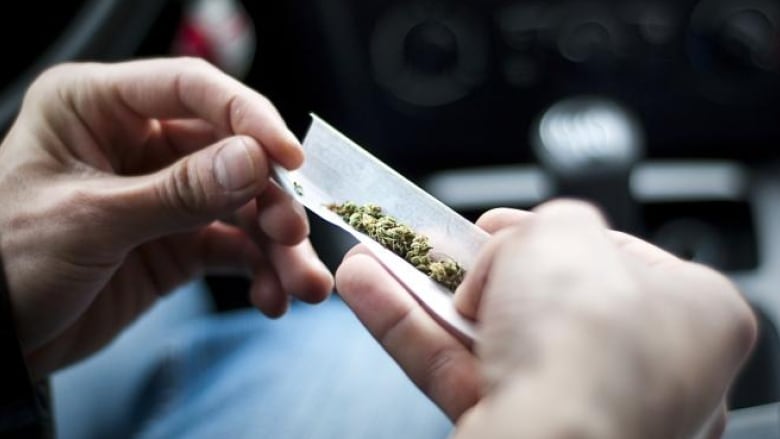Tests for pot-impaired driving flawed, substance abuse expert says
Tests measuring THC levels don't necessarily measure impairment, cannabis expert says

As Alberta adjusts its traffic actin response to the looming legalization of marijuana, anexpert says basing stoned-driving laws on THC levelsis flawed.
On Tuesday the province unveiled Bill 29, which adds cannabis impairment to existing provincial legislation and ensures compliance with the federal impaired-driving laws.
Under that legislation, drivers with between two and five nanogramsof THC per millilitreof blood face a $1,000 fine. Drivers with higher levels face harsher penalties.THC is the active ingredient in marijuana.
DougBeirness, with the Canadian Centre for Substance Abuse and Addiction, said such tests alone arenotgood indicators of cannabis impairment.
"The thing about cannabis is the effects are quite variable,"BeirnesstoldCBC'sRadio ActiveMonday. "You can find impairment at very, very low levels, as well as higher levels."
According to a July 2017 report by the U.S. Department of Transportation, THC levels in blood drop dramatically as much as 80 to 90 per cent within 30 minutes afteringesting.
But, the report said "peak impairment occurs at 90 minutes after smoking while the THC level has declined over 80 per cent from the peak level."
The report concludes that "THC level in blood (or oral fluid) does not appear to be an accurate and reliable predictor of impairment from THC."
Unreliable tests
Beirness said even the tests themselves are problematic because of how difficult it is to administer them. "To do research with an illegal drug, you need special approval," he said.

Once researchersjump the approval hurdle, the cannabis they are provided for the test isn't necessarily what one would buy off the street.
"You're kind of restricted to the cannabis you're supplied with, which tends to be very, very low THC content," he said. "We know absolutely nothing about these higher concentration THC products."
Beirness said he hasn't even thought about studying the higher THC products, like shatter or butter.
The U.S. Department of Transportation report suggests that while cannabis could potentially impair driving skills,its findings in other researchsuggestdrivers under the influence of cannabis are actually more cautious.
"Subjects in most of the simulatorand instrumented-vehicle studies on marijuanaaredriving typically drive slower, follow other cars at greater distances and take fewer risks than when sober," the report said.
The report also said much of the research "does not show a relationship between THC levels and impairment."
Can pot make you asafer driver?
But just because a driver is more cautious doesn't mean they aren't impaired. Sarah Urfer, a toxicologist who works in Colorado, said she hears many people who call themselves better drivers when they're high.
"I have heard thatat least more than once," Urfer said Wednesday on Edmonton AM. She said she asks the person why they think they are a better driver. They usually say they driveslower and leave more space between their vehicle and the next.
Urfer then asks why they need more space and why they drive slower, and the person usually says it takes them longer to stop, or they need to be paying closer attention and maintain caution.
"OK, well what you described is impairment, so trying to mentally compensate for physical impairment doesn't work," Urfer said. "So I suggest you don't do that."
Training officers
Because THC levels and impairment don't necessarily go hand in hand, Beirness said the best way to combat cannabis-impaired driving is to train police officers to recognize it.
"We [need to] have drug recognition experts who are trained to assess drivers who are suspected of using cannabis or other drugs," he said.
Proper training in recognizing those under the influence of drugs makes the unreliable result of THC in blood or saliva less valuable, Beirnesssaid.
Trying to mentally compensate for physical impairment doesn't work.- Sarah Urfer, toxicologist
"We know what a person who has had too much alcohol looks like. Everybody knows that, they can spot them a mile away," Beirness said. "But can you spot a person who has been smoking cannabis? Well, it's a little more difficult.
"You need to know what you're looking for, and we need to train our officers to be able to do that."
Officer recognition, along with the other tests to reinforce their observations, isthe best way to identify stoned drivers, Urfer said.
"You have an officer who has initial observations, signs of impairment on the roadside that is well-documented, a set of tests that tries to help with that documentation, coupled with a blood test," she said. "Taken all together, [this] is a full set of information."
Listen toEdmonton AM (5:30 a.m. - 8:30 a.m.) and Radio Active (3 p.m. to 6 p.m.) weekdays onCBC Radio One, 93.9 FM/740 AM in Edmonton.












_(720p).jpg)


 OFFICIAL HD MUSIC VIDEO.jpg)
.jpg)



























































































